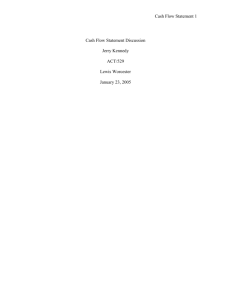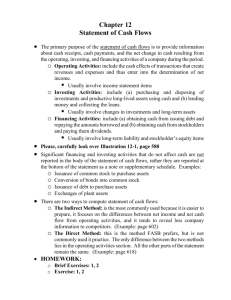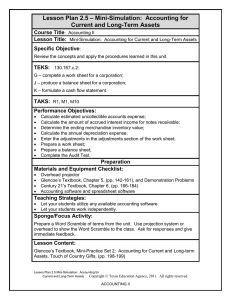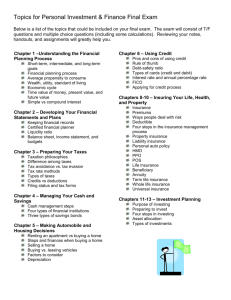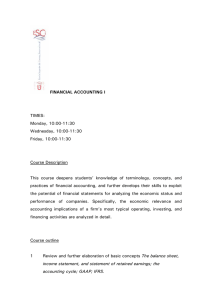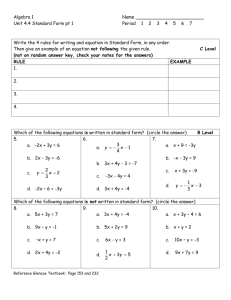– Statement of Cash Flow Lesson Plan 6.2 Course Title Lesson Title
advertisement
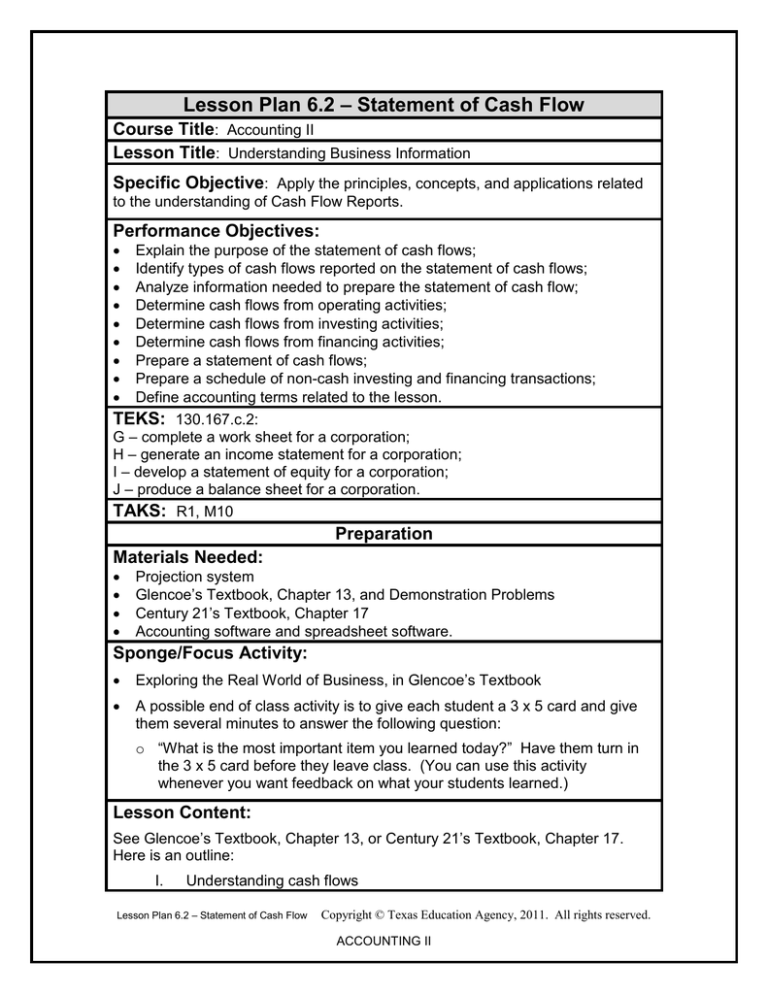
Lesson Plan 6.2 – Statement of Cash Flow Course Title: Accounting II Lesson Title: Understanding Business Information Specific Objective: Apply the principles, concepts, and applications related to the understanding of Cash Flow Reports. Performance Objectives: Explain the purpose of the statement of cash flows; Identify types of cash flows reported on the statement of cash flows; Analyze information needed to prepare the statement of cash flow; Determine cash flows from operating activities; Determine cash flows from investing activities; Determine cash flows from financing activities; Prepare a statement of cash flows; Prepare a schedule of non-cash investing and financing transactions; Define accounting terms related to the lesson. TEKS: 130.167.c.2: G – complete a work sheet for a corporation; H – generate an income statement for a corporation; I – develop a statement of equity for a corporation; J – produce a balance sheet for a corporation. TAKS: R1, M10 Preparation Materials Needed: Projection system Glencoe’s Textbook, Chapter 13, and Demonstration Problems Century 21’s Textbook, Chapter 17 Accounting software and spreadsheet software. Sponge/Focus Activity: Exploring the Real World of Business, in Glencoe’s Textbook A possible end of class activity is to give each student a 3 x 5 card and give them several minutes to answer the following question: o ―What is the most important item you learned today?‖ Have them turn in the 3 x 5 card before they leave class. (You can use this activity whenever you want feedback on what your students learned.) Lesson Content: See Glencoe’s Textbook, Chapter 13, or Century 21’s Textbook, Chapter 17. Here is an outline: I. Understanding cash flows Lesson Plan 6.2 – Statement of Cash Flow Copyright © Texas Education Agency, 2011. All rights reserved. ACCOUNTING II II. III. A. Cash inflows and outflows 1. Cash flows from operating activities 2. Cash flows from investing activities 3. Cash flows from financing activities Preparing the statement of cash flows—operating activities A. The Statement of cash flows 1. The Heading 2. The cash flows from operating activities section i. Cash receipts from sales to customers ii. Cash receipts from interest income iii. Cash payments for purchases iv. Cash payments for operating expenses v. Cash payments for Interest expense vi. Cash payments for income tax expense Completing the statement of cash flows A. The cash flows from investing activities section 1. Purchases of marketable securities 2. Purchases and sales of plant assets B. The cash flows from financing activities 1. Cash flows from short-term borrowing 2. Cash flow from long-term borrowing 3. Cash receipts from issuing capital stock 4. Cash dividends payments to stockholders C. The Schedule of non-cash investing and financing transactions Teaching Strategies: Glencoe’s Demonstration Problems. With the Century 21 textbook, complete the Work Together problems with your students then have students work On Your Own problems by themselves and go over the answers with the class. Assessment: For problems you can use Peachtree Accounting from Glencoe, Glencoe Accounting Software, Century 21 Accounting Software, or a spreadsheet. From Glencoe’s Textbook Problems o Guided Practice 13-1 Analyzing the Statement of Cash Flows 13-2 Determining Cash Payments for Operating Expenses 13-3 Analyzing a Source Document o Independent Practice 13-4 Preparing the Cash Flows from Investing Activities Section of the Statement of Cash Flows. 13-5 Preparing the Cash Flows from Financing Activities Section and the Schedule of Non-cash Investing and Financing Transactions. 13-6 Preparing the Heading and the Cash Flows from Lesson Plan 6.2 – Statement of Cash Flow Copyright © Texas Education Agency, 2011. All rights reserved. ACCOUNTING II Operating Activities Section. 13-7 Preparing the Cash Flows from Investing Activities Section 13-8 Preparing the Cash Flows from Financing Activities Section 13-9 Preparing the Schedule of Non-cash Investing and Financing Transactions 13-10 Preparing a Statement of Cash Flows 13-11 Preparing a Statement of Cash Flows o Additional Activities Using Key Terms, Understanding Accounting Concepts and Procedures, Case Study, Conducting an Audit with Alex, Internet Connection and Workplace Skills o Open Notes and textbook Quiz: Study Guide for Chapter From Century 21’s Textbook o Guided Practice Work Together: Classifying cash flows On Your Own: Classifying cash flows Work Together: Preparing the operating activity section for a statement of cash flows On Your Own: Preparing the operating activity section for a statement of cash flows. Work Together: Preparing the investing and financing activities sections from the statement of cash flows; completing the statement of cash flows On Your Own: Preparing the investing and financing activities sections from the statement of cash flows; completing the statement of cash flows o Independent Practice 17-1 Classifying cash flows 17-2 Calculating the cash flows from operating activities 17-3 Calculating the cash flows from investing activities 17-4 Calculating the cash flows from financing activities and completing a statement of cash flows 17-5 Preparing a statement of cash flows 17-6 Preparing a statement of cash flows o Additional Activities: Applied Communication, and Cases for Critical Thinking o Open Notes and textbook Quiz: Study Guide for Chapter This lesson is also assessed through the Unit Test at the end of the Unit. Additional Resources: Textbooks: Lesson Plan 6.2 – Statement of Cash Flow Copyright © Texas Education Agency, 2011. All rights reserved. ACCOUNTING II Guerrieri, Donald J., F. Barry Haber, William B. Hoyt, and Robert E. Turner, Glencoe Accounting Real-World Applications & Connections, Advanced Course, Fourth Edition, Glencoe McGraw-Hill: New York, New York. Ross, Kenton E., CPA, Mark W. Lehman, CPA, Claudia Bienias Gilbertson, CPA, Robert D. Hanson, Century 21 Accounting Advanced, Anniversary Edition, Thomson South-Western: Mason, OH, 2003. Multimedia: Century 21’s Teacher Resource CD Lesson Plan 6.2 – Statement of Cash Flow Copyright © Texas Education Agency, 2011. All rights reserved. ACCOUNTING II
